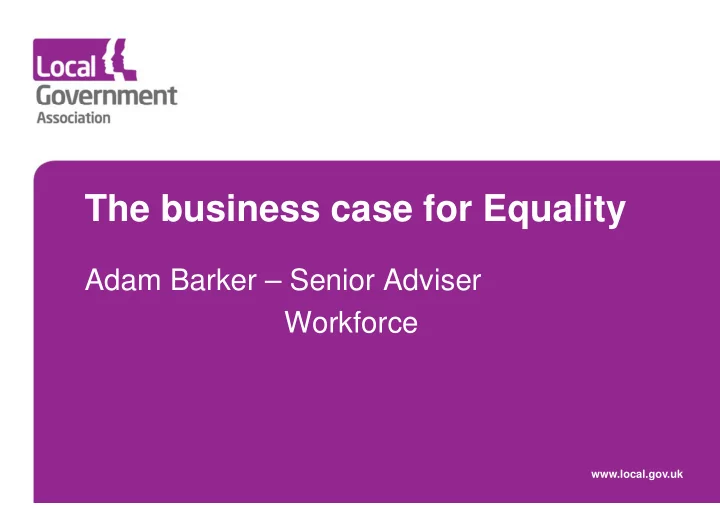

The business case for Equality Adam Barker – Senior Adviser Workforce www.local.gov.uk
Real value added • Inclusion, equality and diversity training can be so much more than compliance and box-ticking. There is real value for your staff, your organisation and your community by championing diversity in all areas. • Inclusive organisations that create more harmonious working environments attract the innovation and loyalty of the best and most diverse talent out there. • The stronger community connections, more harmonious workplaces and enhanced productivity that inclusive practice brings are now established business facts
The business case for equalities is established and robust
Diversity unlocks innovation and drives market growth Diverse firms are 70% more likely to capture a new market
Some local government case studies • Saving money by involving disabled people in the decision- making process- Leicester City Council • Saving resources by addressing Gypsies' and Travelers' accommodation needs - Bristol City Council • Improving educational attainment - Tower Hamlets Council
Leicester city council • Between 2006 and 2008 a number of changes were made to Leicester city centre. The Council assessed the impact of these changes and found that a number had an adverse effect on people with disabilities – for example, increased walking distances to the shops and a loss of blue badge parking spaces. • Leicester Council worked with voluntary sector organisations to listen to the experiences of blind and partially sighted people who used the city centre. They also set up an Inclusive Design Advisory Panel (IDAP), with the purpose of advising council planners about the implications of their plans for disabled people. All planning and design projects now come through the Panel. • This approach has proven to be cost-effective to the organisation. Before the panel’s existence, disabled people’s requirements in respect to access were often picked up too late, when projects were completed. Problems were then costly to rectify and bad for the Council's reputation.
Bristol city • In 1996 there were no authorised sites for travellers in Bristol and illegal encampments were set up on a regular basis. This led to tensions between local residents and travellers. Bristol Council was spending between £200,000-£350,000 annually to deal with the consequences • The Council consulted with Gypsies and travellers to find out if more authorised sites needed to be built. The lack of sites was seen to increase social exclusion, hostility and discrimination. As a result, in 2004 the Council decided to build two sites, one site for travellers on their way to another destination (transit) and another site for travellers settling more permanently. • Almost immediately the resources required to deal with unauthorised encampments decreased dramatically. Families living on authorised sites paid rent to live on the pitches and paid their utility bills. Thus generating revenue and cutting expenditure. Gypsies and travellers now have better access to basic services and it has reduced tensions with the settled community.
Tower hamlets • In 1990, only 8% of Tower Hamlets pupils left school with 5+ A-Cs at GCSE, and educational expectations for young people from deprived communities were low. • Significant investment in creating a community of schools united around the common goal of raising attainment with emphasis on increasing parental involvement. • As a large percentage of residents were Muslim, local mosques were involved to encourage better attendance at school. In addition an Education and Business Partnership ensured that a corporate sponsor (including from firms in the city, nearby) joined the governing body of every school. Mentors have also provided support to pupils with activities like reading and helping to find work experience. • By 2012, 62% of children in Tower Hamlets left schools with 5+ A-Cs at GCSE. The actions taken by the Council have also improved the reputation of local secondary schools, which all received a 'good’ or 'outstanding' rating from Ofsted.
How we can be more Inclusive? Quick checklist http://www.local.gov.uk/employment-relations
Benefits • Changing minds needn’t be expensive • Recruitment and retention • Community and employee engagement • Productivity • EHRC case studies illustrate many advantages from equality initiatives • http://www.equalityhumanrights.com/private-and-public-sector-guidance/public- sector-providers/case-studies
Recommend
More recommend